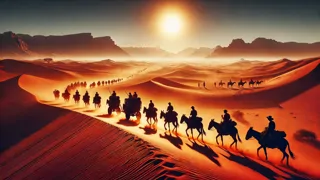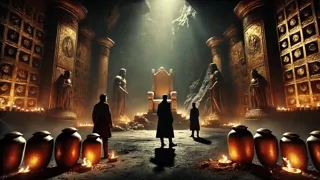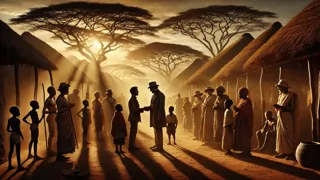Introduction
Not every legend begins in shadow. On a mildly drizzling evening in London, 1883, the gaslit streets were silvered with rain; the clatter of hansom cabs and the scent of coal fires curled between the grand houses of Mayfair. Inside a drawing room lined with well-worn travel maps and stuffed with relics of far-flung places, Allan Quatermain stood brooding over his latest correspondence. Across from him, Sir Henry Curtis—tall, resolute, with eyes like grey steel—drummed his fingers on a rosewood desk with restless excitement. By the fire, the robust Captain John Good adjusted his monocle and mustache, face aglow with both anticipation and apprehension.
Scattered items—an ivory-handled revolver, a compass older than Queen Victoria, and a battered leather satchel—suggested imminent departure. The air buzzed with the promise of discovery, and ever since a mysterious visitor had pressed a crumbling, age-stained map into Quatermain’s hands, each man knew this was no ordinary venture. Rumor placed King Solomon’s legendary mines, hewn from African rock and steeped in ancient wealth beyond imagination, somewhere beyond the known world—a place where white fog crowned black mountains, and rivers twisted through parched wilderness.
For Quatermain, a lifetime on the continent’s rim had fostered not only skill but also humility before Africa’s secrets. None of the three men was naïve about the continent’s rigors—hostile terrain, fearsome wildlife, and dangers less tangible but far greater. Yet the lure of the unknown and the idea of unearthing history’s most storied treasure, paired with the hope of rescuing a lost explorer rumored held captive by tribal kings, proved magnetic. With the map, a clutch of journals, and a pact sealed by firm handshakes and heavier hopes, the trio set sight on the journey that would define them all.
Into the Heart of Africa
The Atlantic voyage south was a blur of salt spray, unfamiliar stars, and anxious anticipation—no one slept soundly with dreams of Solomon’s gold or the fate awaiting them inland. Quatermain, having weathered Africa’s heat and cold before, assumed command as they assembled pack mules, gathered water barrels, and recruited a small but loyal retinue. Kivuli, an experienced Zulu guide with knowledge of unmarked trails and hidden dangers, was last to join, but his presence was as essential as any rifle or relic.

Their caravan rattled through trading posts and villages, shadows lengthening as forests gave way to grassland and the sun beat down with uncompromising indifference. Days blurred into a pattern: blazing heat followed by velvet African nights, the air thick with insect drone and curiously sweet from flowering acacias. But as the land shifted from green to ochre and the map grew vaguer, the real challenge began. The terrain was harsher than any London drawing-room tale could conjure—dust-devils snaked over cracked earth, and mountains like the spines of ancient gods loomed in the blue haze ahead.
One evening, as the company crossed a river, a sudden rush of crocodiles panicked the mules. Two crates—one with precious medical supplies—were lost to the rolling current. Captain Good, flustered but undeterred, rallied spirits with a bawdy story, while Sir Henry nursed a grazed arm. Quatermain, pragmatic as ever, pressed Kivuli for guidance. Sometimes the path seemed guided more by instinct than compass or star.
But it was the Kalahari desert that earned their deepest fear and respect. Provisions had been rationed, but the sandy wastes drained man and beast alike. The cracked lips of Sir Henry, the gaunt cheekbones of Captain Good, and Kivuli’s muted warnings all told of water’s scarcity and its life-or-death value. At night, by thin fires, Quatermain spoke in low tones about patience and humility, and the desert, sometimes, seemed to listen. When, finally, they stumbled into the green arms of an oasis, the taste of clear water was like a sacrament.
By the time they reached the jagged peaks rumored to hide Solomon’s mines, the men had grown leaner in body and sharper in will. Yet Africa’s challenges were not just geography or hunger. One moon-bright night, the group encountered an isolated Kupa village. Suspicion ran high, but with Kivuli as mediator, they were received—barely. An elder, swirling snuff in his palm, spoke of “The Mountain that Sings” and “the Valley Where Shadows Walk.” He offered a warning: the deeper you delve for gold, the greater a man’s spirit is tested.
They pushed onward, ever deeper into myth and danger, hearts pounding with both fear and feverish hope.
The Forbidden Mountains
It was on the slick approach of thunder that the sharp, black mountains emerged from morning mist—Solomon’s Mountains, their pinnacles knife-edged, their bases draped in tangled forest. The ascent wove up rocky escarpments blistered by sun and rain. Vines crept along crags, thick as a sailor’s braid, and every echo called forth the sense of an ancient presence. Kivuli whispered of songs woven into wind and stone, stories told to frighten children, though he, too, couldn’t quite keep the trembling from his voice.

Using the map and Kivuli’s memory, they found a half-buried entrance: a slab carved with indecipherable characters, flanked by guardian statues of basalt. The air within was cool, dense, and almost sweet—so different from the parched world outside, it felt enchanted. By torchlight, they descended twisting passageways. In the glow, stalactites glimmered, and walls bore faded murals: kings holding scepters, processions of elephants, shields painted with stars.
At intervals, the tunnels split and rejoined, like the braided strands of a crown. Strange traps and riddles, centuries dormant, awaited them: rolling stones, false floors, shrines demanding silent prayers at which Kivuli alone seemed to know the words. Once, a sudden slide sent Captain Good tumbling into a hidden chamber of bones—a macabre reminder that greed had lured many to their doom.
Pressing on, the explorers discovered a vast cavern, its roof lost in shadow. There, in natural pillars draped with moss and gold leaf, a stairway twisted up to a platform. Upon it, a throne—empty, yet crowned with gold, flanked by jars overflowing with rough gemstones. Sir Henry, awed, could only whisper, “We’ve found it—history made stone.” Yet Quatermain pressed them to caution: treasures were never theirs alone to claim. They cataloged what they could, sketched the throne and the strange hieroglyphs, but left much untouched.
Their exit proved more perilous than the entry. Earth tremors rumbled—the price, perhaps, for trespass. Kivuli shouted for haste. Chunks of carved rock crashed behind them as they fled. When at last they burst into the blazing daylight, all—Sir Henry, Good, Kivuli, even Quatermain—fell to their knees in gratitude, hair and garments powdered with the dust of legend. Behind them, Solomon’s Mines sealed with another rockfall, as if the hills had never opened at all.
Return and Revelation
Emerging from the mountains, the company found a world subtly changed. More than just dust and bruises, they carried scars beneath the surface—etched by awe, danger, and the sobering sense that some riches are better left unearthed. Their exit from the hills marked not triumphant conquest but humbled survival.

They returned to the Kupa village, greeted with wary respect: strangers who had returned from places no one else dared go. Kivuli translated their tale—describing guardians, riddles, and the throne no living king could claim. The village’s elders listened, then offered a feast. Over roasted maize and wild honey, stories flowed—how ambition and wisdom must keep uneasy company, how what’s found is less important than what’s learned along the journey. When Sir Henry showed the smallest of the gems, Kivuli pressed it gently back into his palm. "Honor the land, honor the story," he murmured. Treasure, it seemed, did not always cross borders.
The return through desert and plain held new marvels: herds of elephants passing by like ancient phantoms; children tracing Quatermain’s bootprints in playful awe. Their team was smaller, hearts heavier, but bonds sealed in hardship proved unbreakable. When they at last bid Kivuli farewell and sailed for England, each man felt the pull of Africa at his back—a homesickness for sunsets over raw earth, the thunder of distant falls, and secrets only the continent could keep.
In London, tales of the journey inflamed parlors and penny journals, but not all wonders could be conveyed. Allan Quatermain, ever the wise skeptic, published a memoir that underplayed the gold and lauded the courage, humility, and deep respect the journey had imprinted upon them. Sir Henry Curtis, forever changed, quietly funded African schools; Captain Good returned to service, always with a green jasper stone in his waistcoat pocket—a piece of the legend to remind him of the adventure and the friends who’d endured it by his side.
King Solomon’s treasure, in the end, proved as much a riddle of courage and conviction as a hoard of rubies or gold. The mines, their secret places, had offered a mirror to those bold enough to peer within—a truth more enduring than any trove waiting at the world’s end.
Conclusion
In the search for King Solomon’s Mines, Allan Quatermain and his companions had sought glittering proof of myth, but what they found was richer still: a land of untamable beauty and people whose customs demanded humility and adaptation. The hardships along the desert and mountain paths carved away boastful illusions, leaving courage, camaraderie, and a new respect for the histories embedded in Africa’s soil. The mines themselves—sealed once more by disaster or fate—became not just a whispered legend but a private testament to risk, wonder, and the limits of ambition. Returned to England, each man bore the journey in his bones: not as a tally of jewels, but as a narrative etched in awe and gratitude. For anyone bold enough to seek the unknown, the true reward, they realized, is learning to see the world—and oneself—anew.

















